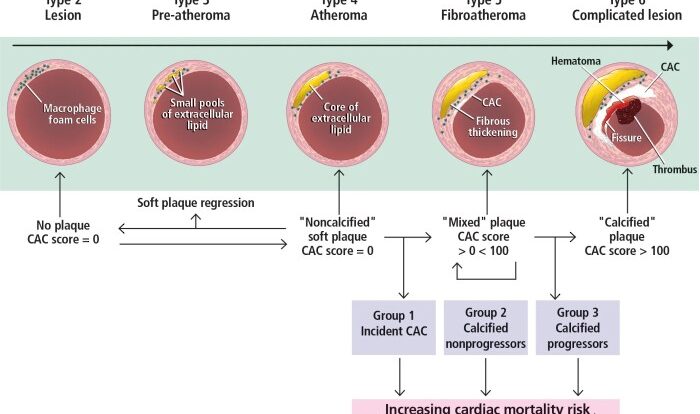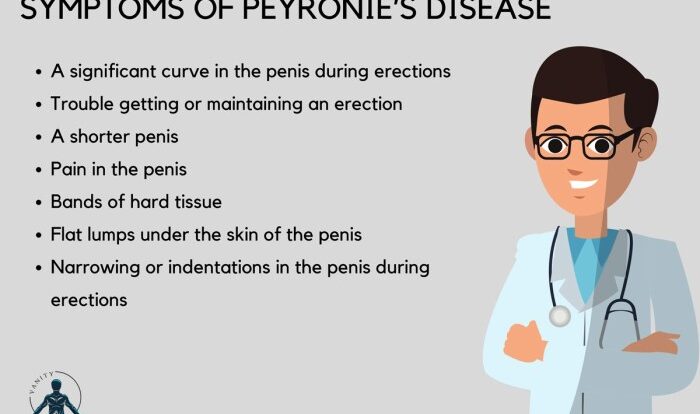My husband and I are both carriers of cystic fibrosis, a genetic condition that can have serious implications for our future family. In this comprehensive guide, we will delve into the complexities of carrier status, its impact on our reproductive choices, and the latest advancements in cystic fibrosis research and treatment.
Together, we will navigate this journey with knowledge, hope, and a unwavering determination to provide the best possible future for our children.
Medical Overview of Cystic Fibrosis
Cystic fibrosis (CF) is an inherited disorder that affects the lungs, digestive system, and other organs. It is caused by mutations in the CFTR gene, which leads to the production of defective or missing CFTR protein. This protein helps to regulate the movement of salt and water in and out of cells, and its absence or malfunction can lead to a buildup of thick, sticky mucus in the airways and other organs.
Symptoms of Cystic Fibrosis
The symptoms of CF can vary depending on the severity of the condition, but may include:
- Persistent coughing, wheezing, and shortness of breath
- Thick, sticky mucus that can block the airways and lead to infections
- Frequent lung infections, such as pneumonia and bronchitis
- Difficulty gaining weight and malnutrition
- Salty-tasting skin
- Pancreatitis (inflammation of the pancreas)
- Liver disease
- Infertility in men
Complications of Cystic Fibrosis
If left untreated, CF can lead to serious complications, including:
- Respiratory failure
- Heart disease
- Liver failure
- Diabetes
- Osteoporosis
- Arthritis
Inheritance Pattern of Cystic Fibrosis
CF is an autosomal recessive disorder, which means that both parents must carry the CFTR gene mutation for a child to inherit the condition. If both parents are carriers, each child has a 25% chance of having CF, a 50% chance of being a carrier, and a 25% chance of not having CF or being a carrier.
Carrier Status and Implications
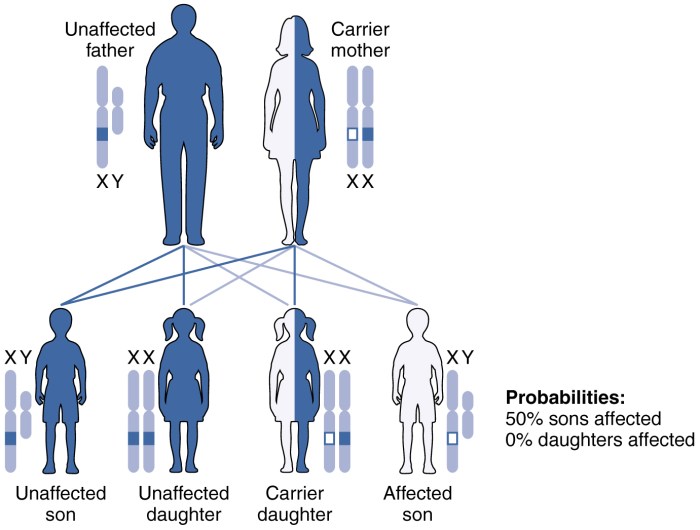
A carrier is a person who has one normal gene and one mutated gene for a particular trait. In the case of cystic fibrosis, carriers have one normal CFTR gene and one mutated CFTR gene. Carriers do not have cystic fibrosis themselves, but they can pass the mutated gene on to their children.
The risks and implications for carriers of cystic fibrosis include:
- Increased risk of having a child with cystic fibrosis.If both parents are carriers, there is a 1 in 4 chance that their child will have cystic fibrosis.
- Increased risk of other health problems.Carriers of cystic fibrosis may have an increased risk of developing certain health problems, such as chronic sinusitis, nasal polyps, and infertility.
Genetic testing can be used to determine if a person is a carrier of cystic fibrosis. Genetic testing is recommended for people who have a family history of cystic fibrosis or who are planning to have children.
Reproductive Considerations
When both parents are carriers of cystic fibrosis, they have a 25% chance of having a child with the condition. Prenatal testing can be performed to determine if a fetus has cystic fibrosis. Genetic counseling can help couples understand the risks and options available to them.
Assisted Reproductive Technologies for Carriers
Assisted reproductive technologies (ART) can be used to help carriers of cystic fibrosis have children who are not affected by the condition. These technologies include:
- In vitro fertilization (IVF) with preimplantation genetic diagnosis (PGD): IVF involves fertilizing eggs in the laboratory and then testing the embryos for cystic fibrosis before implanting them in the uterus. PGD can identify embryos that do not have cystic fibrosis.
- Intracytoplasmic sperm injection (ICSI) with PGD: ICSI is a procedure in which a single sperm is injected directly into an egg. PGD can then be used to test the embryos for cystic fibrosis.
Treatment and Management
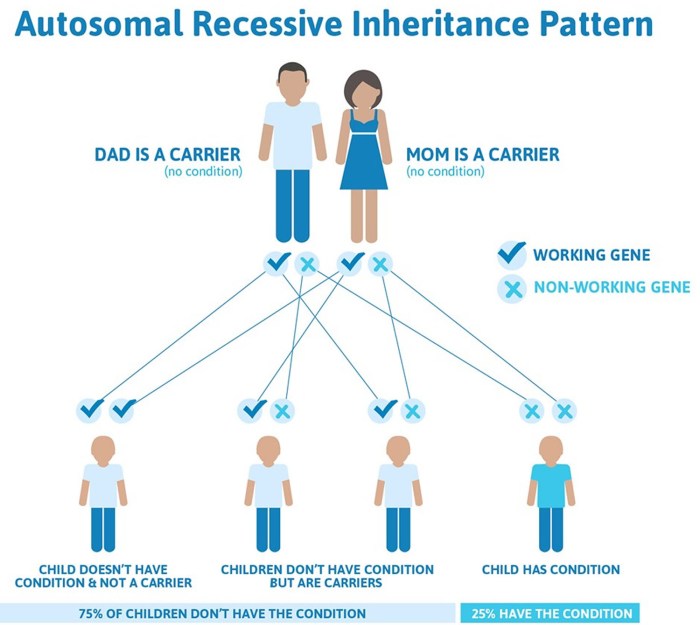
Cystic fibrosis (CF) is a complex and progressive disease that requires a comprehensive approach to management. The current treatment landscape focuses on improving quality of life, preventing complications, and maximizing lung function.
A multidisciplinary team approach involving pulmonologists, gastroenterologists, nutritionists, and other specialists is crucial for effective CF management.
Medications
Medications play a vital role in managing CF. They include:
- Bronchodilators: Open up the airways, making it easier to breathe.
- Mucolytics: Thin and loosen mucus, making it easier to clear.
- Antibiotics: Prevent and treat lung infections, which are a major cause of morbidity in CF.
- Anti-inflammatory drugs: Reduce inflammation in the airways and digestive system.
- Pancreatic enzyme replacement therapy: Replaces enzymes that are missing or not working properly in the pancreas, aiding digestion.
Therapies
Therapies also form an important part of CF management:
- Chest physiotherapy: Helps clear mucus from the lungs through techniques such as postural drainage and percussion.
- Exercise: Regular physical activity improves lung function and overall health.
- Nutritional support: Ensures adequate intake of calories and nutrients to support growth and maintain weight.
Lifestyle Modifications
Lifestyle modifications can also positively impact CF management:
- Quitting smoking: Smoking worsens lung function and increases the risk of infections.
- Avoiding secondhand smoke: Exposure to secondhand smoke can also damage the lungs.
- Getting vaccinated: Regular vaccinations, including those for influenza and pneumonia, are essential for preventing infections.
- Maintaining a healthy weight: Obesity can worsen lung function and make it harder to breathe.
Latest Advancements, My husband and i are both carriers of cystic fibrosis
Research into CF is ongoing, with promising advancements being made:
- Gene therapy: Aims to correct the underlying genetic defect in CF.
- Modulator therapies: Drugs that target the defective protein in CF, improving lung function and reducing mucus buildup.
- Novel antibiotics: New antibiotics are being developed to combat the antibiotic-resistant bacteria that can cause infections in CF.
Emotional and Psychological Impact: My Husband And I Are Both Carriers Of Cystic Fibrosis
Carriers and individuals affected by cystic fibrosis (CF) face significant emotional and psychological challenges. The diagnosis can bring feelings of guilt, anxiety, and uncertainty about the future. Carriers may worry about passing on the condition to their children, while affected individuals may struggle with the physical and emotional burdens of the disease.
Support Groups and Counseling
Connecting with others who understand the challenges of CF can provide invaluable support. Joining support groups or seeking professional counseling can help individuals and families cope with the emotional toll of the condition. These resources offer a safe and supportive environment to share experiences, learn from others, and access practical advice.
Coping Mechanisms and Strategies
Managing the psychological burden of CF requires effective coping mechanisms and strategies. These may include:
-
-*Education
Understanding the condition and its implications can help individuals feel more empowered and in control.
-*Open communication
Talking about feelings and concerns with family, friends, or a healthcare professional can provide emotional relief.
My husband and I are both carriers of cystic fibrosis, a genetic condition that can cause respiratory problems. To stay healthy, we need to take extra care of our bodies. One way we do this is by getting regular chiropractic adjustments.
Chiropractors can help with a variety of conditions, including bursitis of the hip . Bursitis is a condition that causes inflammation of the bursa, a fluid-filled sac that cushions the bones. It can be very painful, but chiropractic adjustments can help to reduce inflammation and pain.
My husband and I have both found chiropractic care to be very beneficial, and we would highly recommend it to anyone with cystic fibrosis.
-*Self-care
Prioritizing physical and mental well-being through healthy habits, such as exercise, meditation, and getting enough sleep, can improve resilience.
-*Seeking support
Don’t hesitate to reach out for help when needed. Support groups, counselors, or other trusted individuals can provide a listening ear and offer practical assistance.
Family Planning and Support
Family planning is crucial for carriers of cystic fibrosis. It involves discussing the potential risks and implications of having children with someone who also carries the CF gene. Genetic counseling can provide valuable information and support during this process.Extended family and friends can play a significant role in providing emotional and practical support to carriers and their families.
They can offer assistance with childcare, transportation, or simply a listening ear. Sharing experiences and information with others who understand the challenges of CF can be invaluable.
Resources for Organizations and Support Networks
Several organizations and support networks offer resources and support to carriers of cystic fibrosis and their families:*
- Cystic Fibrosis Foundation: https://www.cff.org/
- National Cystic Fibrosis Registry: https://www.cff.org/Care-Center-for-Families/National-Cystic-Fibrosis-Patient-Registry/
- Cystic Fibrosis Parents Network: https://www.cfpn.org/
- Children’s Lung Health Network: https://www.childrenslunghealthnetwork.org/
Education and Awareness
Education and awareness are crucial in the fight against cystic fibrosis. By spreading knowledge about the condition, we can reduce stigma, promote early detection, and improve the quality of life for individuals affected by CF.
Public Health Campaigns and Advocacy Groups
Public health campaigns play a vital role in educating the general public about cystic fibrosis. These campaigns raise awareness about the symptoms, diagnosis, and treatment options for CF, dispelling misconceptions and encouraging timely screening.
Advocacy groups are also instrumental in advocating for the rights and needs of individuals with CF. They work to ensure access to quality healthcare, support research, and provide a voice for the CF community.
My husband and I are both carriers of cystic fibrosis, which means our children have a 25% chance of inheriting the condition. While our kids are healthy, we still worry about their future health. One thing we’ve considered is renting a portable oxygen concentrator for vacations.
Can I rent a portable oxygen concentrator for vacation ? This would give us peace of mind knowing that our kids would have access to oxygen if they needed it. We’re still researching our options, but it’s something we’re definitely considering.
Educational Resources and Support Organizations
Numerous educational resources and support organizations provide invaluable information and support to individuals and families affected by cystic fibrosis. These organizations offer a range of services, including:
- Educational materials and resources
- Support groups and peer-to-peer networking
- Advocacy and policy initiatives
- Financial assistance and other support services
Ethical Considerations
Genetic testing for cystic fibrosis raises ethical concerns that warrant careful consideration. It involves balancing individual autonomy, reproductive rights, and societal responsibilities.
Reproductive Choices and Genetic Counseling
Genetic counseling plays a crucial role in informing carriers about the risks and implications of having a child with cystic fibrosis. It empowers them to make informed decisions about their reproductive choices. However, some argue that genetic testing may create undue pressure or limit reproductive freedom.
Responsibilities of Carriers and Potential Parents
Carriers have a responsibility to be aware of their status and the potential risks to their offspring. They should consider genetic testing and counseling before conceiving. Potential parents also have a responsibility to weigh the ethical implications of their decisions and consider the well-being of any future children.
Future Directions and Research
The fight against cystic fibrosis continues, with ongoing research and clinical trials offering hope for a brighter future. Gene therapy and other innovative treatments hold the potential to transform the lives of individuals with CF.
Gene Therapy
- Gene therapy aims to correct the defective CFTR gene, enabling cells to produce functional CFTR protein.
- Clinical trials have shown promising results, with some participants experiencing significant improvements in lung function and reduced CF symptoms.
Other Innovative Treatments
- Modulators target the defective CFTR protein, improving its function and reducing CF symptoms.
- Anti-inflammatory therapies aim to reduce inflammation in the lungs, a major complication of CF.
- Novel antibiotics are being developed to combat the persistent bacterial infections that often accompany CF.
Future Outlook
With these ongoing research efforts, the future for individuals with cystic fibrosis is filled with hope. Gene therapy and other innovative treatments have the potential to significantly improve their quality of life and longevity.
Resources and Support
Navigating the complexities of cystic fibrosis requires a strong support system. Fortunately, numerous resources are available to provide guidance, information, and emotional support to carriers and affected individuals.
Since my husband and I are both carriers of cystic fibrosis, we’re always looking for ways to improve our health and well-being. One thing that’s been on my mind lately is laser hair removal on my legs. I’ve heard that it can be a great way to reduce hair growth and make my skin smoother.
I’ve been doing some research on how many sessions for laser hair removal on legs , and I’m thinking about giving it a try. I’m hoping that it will help me feel more confident in my skin and reduce the amount of time I spend shaving.
The following table lists reputable organizations that offer a range of services, including support groups, educational materials, and access to medical professionals:
Support Groups
- Cystic Fibrosis Foundation: https://www.cff.org/
- Cystic Fibrosis Association of Canada: https://www.cysticfibrosis.ca/
- Cystic Fibrosis Ireland: https://www.cfireland.ie/
Advocacy Organizations
- Cystic Fibrosis Trust: https://www.cysticfibrosis.org.uk/
- Australian Cystic Fibrosis Foundation: https://www.cysticfibrosis.org.au/
- New Zealand Cystic Fibrosis Association: https://www.cfanz.org.nz/
Medical Professionals
- Cystic Fibrosis Centers of Excellence: These centers provide specialized care and expertise in the treatment of cystic fibrosis.
- Cystic Fibrosis Care Teams: These teams typically include pulmonologists, gastroenterologists, nutritionists, and other healthcare professionals who collaborate to provide comprehensive care.
- Genetic Counselors: Genetic counselors can provide information and support to carriers and affected individuals, including discussing inheritance patterns and reproductive options.
Personal Stories and Experiences
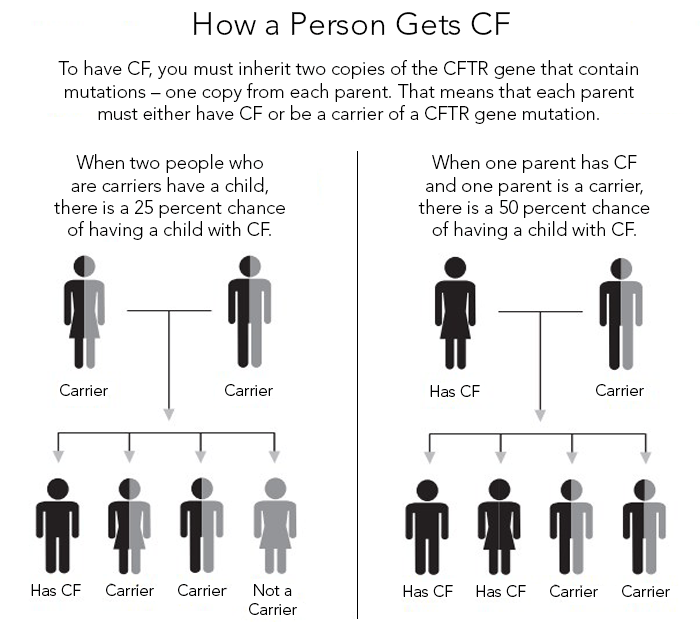
Cystic fibrosis is a complex and challenging condition, and the personal experiences of those affected can vary greatly. Sharing real-life stories and experiences can provide valuable insights into the impact of cystic fibrosis on individuals and their families.
We encourage carriers and affected individuals to share their stories and experiences in a dedicated section of this website. These narratives can offer support, understanding, and inspiration to others who are navigating similar journeys.
Quotes and Testimonials
- “Cystic fibrosis has taught me the importance of perseverance and resilience. It’s not always easy, but I’m grateful for the support of my family and the advancements in treatment that have given me a better quality of life.”
- “Being a carrier for cystic fibrosis has made me more aware of my health and the importance of genetic testing. It’s also inspired me to advocate for others who are affected by genetic conditions.”
- “My child was diagnosed with cystic fibrosis at a young age. It was a difficult time, but we’ve learned so much about the condition and the incredible strength and resilience of our child.”
Support and Connection
In addition to sharing personal stories, we offer a dedicated support forum where carriers and affected individuals can connect with others who are facing similar challenges. This forum provides a safe and supportive space for sharing experiences, asking questions, and offering encouragement.
Final Conclusion
As we continue to learn and adapt, we find solace in the support of others who have walked similar paths. Through open communication, informed decision-making, and a commitment to our family’s well-being, we face the future with both trepidation and optimism.
While the road ahead may be uncertain, we are confident that with knowledge as our guide and love as our compass, we will navigate the challenges of cystic fibrosis with resilience and grace.
User Queries
What is the risk of having a child with cystic fibrosis if both parents are carriers?
If both parents are carriers, there is a 25% chance that each child they have will inherit the condition.
What are the symptoms of cystic fibrosis?
Symptoms can vary, but common signs include persistent coughing, wheezing, difficulty breathing, and salty-tasting skin.
Is there a cure for cystic fibrosis?
Currently, there is no cure for cystic fibrosis, but treatments have improved significantly and can help manage the condition.
What is the life expectancy for someone with cystic fibrosis?
Advances in treatment have significantly increased the life expectancy of individuals with cystic fibrosis, with many now living into their 30s, 40s, and beyond.
What support is available for families affected by cystic fibrosis?
Numerous support groups, organizations, and resources are available to provide emotional, practical, and financial assistance to families coping with cystic fibrosis.
